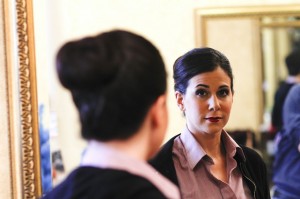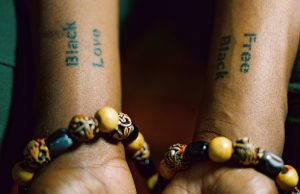2 pieces by Julia Gordon
Walter Closes the Door Gently
When somebody dies in this community, the people within, not knowing how else to ease the burden of grief that they cannot unyoke from the mourners’ shoulders, fall back on one thing that they can do: they bring food. Great trays of it. Lasagna and pot roast. Green bean casserole and stuffed shells. Vats of frozen chicken soup, with thick jackets of congealed fat, baked ziti, salami, three-bean chili. Pizza. If it can be frozen, easily heated and stored indefinitely, people will bring it to the house and ring the bell and step back stand on the stoop, holding their strangely intimate gifts in both hands, offering them to Walter like an altar-bound sacrifice. Walter will reach out to take the trays, his false smile firmly in place, and before the weight of the dish has been fully transferred from the giver’s hands to Walter’s, the figure on the doorstep will be turning away; in a moment the length of a sigh, the giver will be gone. With an embarrassed shake of the head, a shoulder shrug, a shifty sideways glance, they excuse themselves from the premises. That one is late to aerobics and this one has to pick the girls up from soccer, and her mother is in town and she has a meeting of the PTA. Their excuses are all different but the end result of each encounter is the same: here is Walter, standing in his doorway, fingers cold to the point of pain from holding deep frozen metal cooking trays, staring at a pair of swiftly retreating legs, simultaneously wishing his brief company would stay and being eternally grateful for such a quick visit. In that moment of frenzied and discordant thought, when Walter’s mind is filled with cold fingers and regret and relief and now, the draft from the open door, too; in that moment there is enough to occupy his thoughts and the reason behind the visits themselves are subsumed. But it is also true that this moment is every time followed by the next, also always the same: the instant when the truth of the visit and the reason for the frozen tray and the cause of the shifty glance and the swift excuse is remembered in a rush, and Walter’s grief floods back so fast and high he almost chokes on the wave, because there is a new truth now, and that truth is absence, that truth is death. Walter closes the door gently so as not to wake Sarah; he wills his body to turn, his feet to take the seventeen steps across the great room and toward the kitchen and, arriving at last, throws the food, tray and all, into the wide mouth of the trash can that sits just inside the kitchen door.
Listing
after Michael Ondaatje
Legacy
Three unfinished crossword puzzles. An erasable pen: red, the color she could see best. A fragile heart, made of diamonds. A brown leather wallet with a secret compartment for “mad money.” What I would call an allowance. A size 22 muumuu. A body-shaped indent, sunk into her side of a flowered couch. The smell of roses.
Familiar
A portrait of a young girl: impossibly fair skin, rosebud mouth, blonde curls, she holds a white cat with feathery hair so large in her arms that there is mystery in why it hasn’t fallen. After she dies, a white cat appears in the yard, walking back and forth along the thin wooden fence. My sister says “that’s her, I’m sure of it.”
Sustenance
After my aunt is born, a late-in-life baby, she stops cooking altogether, and my mother, 11, has to learn. In later years, she will make only macaroni and cheese, though from “scratch:” pasta shells. Kraft slices. Milk.
Criticism
“Of course she was sick, it was my wedding day. What did you expect? I got dressed by myself.”
Overheard
She was never a mother to me.
Fantasy
There were no dead children. There were no days of silence. Nobody knew us on a first-name basis at the nurses’ station. There was no phone call from an uncle, moments before he stepped off the chair and into the still air saying, “tell Bea I’m sorry.”
Reprise
The smell of roses. Mouths full of melted cheese. Gin rummy on the flowered couch. The beginning and end of silence. The white cat, in a corner of the yard, found dead but not mauled, like a child’s toy: soft, still warm, but quickly cooling, soon stiff.
Julia R. Gordon is a fiction and creative non-fiction writer and blogger (www.theskeinblog.com) with a background in government and political media, fundraising, and message development. For over a decade, Julia has worked as a one-on-one writing consultant for individuals in both creative and academic realms. She currently works as a grant writer and serves on the Board of Directors for Casa Libre en la Solana, a Tucson, AZ-based literary arts organization. Prior to relocating to Tucson from Brooklyn, NY, Julia worked for such organizations as Pace University, Cornell University Medical College, the New York City District Council of Carpenters, the Alliance for Quality Education and East River Media, in addition to holding positions with several city- and statewide political campaigns throughout the country. Julia is a graduate of Cornell University.





4 Comments